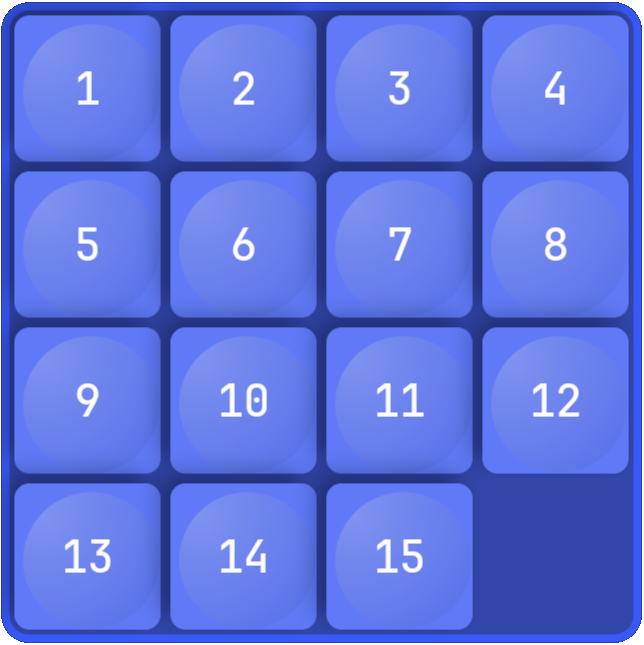Step 3 - Instantiate prefabs¶
In this step, you learn how to instantiate prefabs from a Lua script.
To instantiate a prefab to the node tree:
Find a prefab with
tryAcquireResource.Create a node from the prefab with
instantiate.Add the node to the node tree with
addChild.
-- Find the node with the alias "Grid".
local grid = contextNode:lookupNode("#Grid")
assert(grid)
-- Find the "Piece" prefab.
local piecePrefab = contextNode:tryAcquireResource("kzb://fifteen_puzzle/Prefabs/Piece")
-- Use the piecePrefab to create a node named "New piece".
local node = piecePrefab:instantiate("New piece")
-- Add the node to the grid.
grid:addChild(node)
Add pieces to the puzzle grid¶
Instantiate Piece prefabs to populate the puzzle grid with 15 pieces in order from 1 to 15. You leave the last grid slot empty so that you can play the game.
To add pieces to the puzzle grid, in the Script Editor, replace the content of the new_game.lua script with:
print("Entering new_game.lua")
-- Find the "Grid" node using its alias.
local grid = contextNode:lookupNode("#Grid")
assert(grid)
-- Find the "fifteen_puzzle.PieceIndex" custom property type.
local PieceIndexProperty = PropertyType:new("fifteen_puzzle.PieceIndex")
-- Find the "Piece" prefab.
local piecePrefab = contextNode:tryAcquireResource("kzb://fifteen_puzzle/Prefabs/Piece")
-- Declare the constants for the grid size and number of pieces.
-- The number of pieces is one less than the number of grid slots
-- because you need an empty slot to play the game.
local RowCount = 4
local ColumnCount = 4
local PieceCount = RowCount * ColumnCount - 1
-- Remove all grid items that were created in the project or by the earlier
-- executions of the script.
grid:removeAllChildren()
-- Create the grid child nodes.
for i = 1,PieceCount do
-- Create a grid item.
local piece = piecePrefab:instantiate("piece_" .. i)
-- Assign the number to the piece.
piece:setProperty(PieceIndexProperty, i)
-- Set the grid coordinates of the node.
-- Use integer division to get the row index and modulo to get the column index.
local row = (i-1) // ColumnCount
local column = (i-1) % ColumnCount
piece:setProperty(GridLayout2D.RowProperty, row)
piece:setProperty(GridLayout2D.ColumnProperty, column)
-- Add the node to the grid.
grid:addChild(piece)
end
print("Exiting new_game.lua")
When you save the script and in the Preview click  , the script populates the grid with 15 pieces in order from 1 to 15 and leaves the last slot in the grid empty.
, the script populates the grid with 15 pieces in order from 1 to 15 and leaves the last slot in the grid empty.
